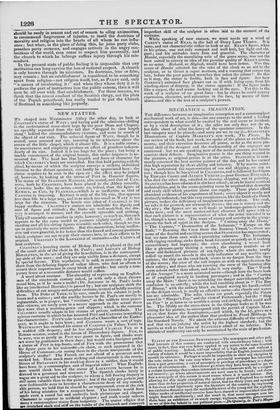TALENT OF TILE ENGLISH NEWSPAPERS.—The newspapers and other poli- tical
journals of this country are conducted with extraordinary talent ; with more, in fact, than was ever before applied in any nation to the same function of public teaching. Indeed, without talent of a high order and without a variety of talent, it would be a mere impossibility that an English journal should sustain its existence. Perhaps it would be impossible to show any exception to the rule, unless in the rare case where a provincial newspaper has inherited, from a past generation, a sort of monopoly or privilege of precedency as a depo- sitary of advertisements. Advertisers go where they have been used to go, on a certain knowledge that readers interested in advertisements will, by a recipro- cal necessity, go where advertisements are most sure to be found ; and there- fore a monopoly of this nature is most secure where it is most intense. But, allowing for this single exception, the political press of England has so much more than its fair proportion of natural talent, that for thirty years and upwards it has even acted injuriously upon the literature of the country, by impressing too exclusive direction upon the marketable talent of the young and the aspiring. Other modes of intellectual exercise have beer, starved or impoverished that this might flourish exorbitantly ; and the result is, that never amongst men has there been an exhibition of so much energy, vigilance, sagacity, perseverance, as we of this da behold in our political press.—De Quince y, in I'ait's Maga-


























 Previous page
Previous page